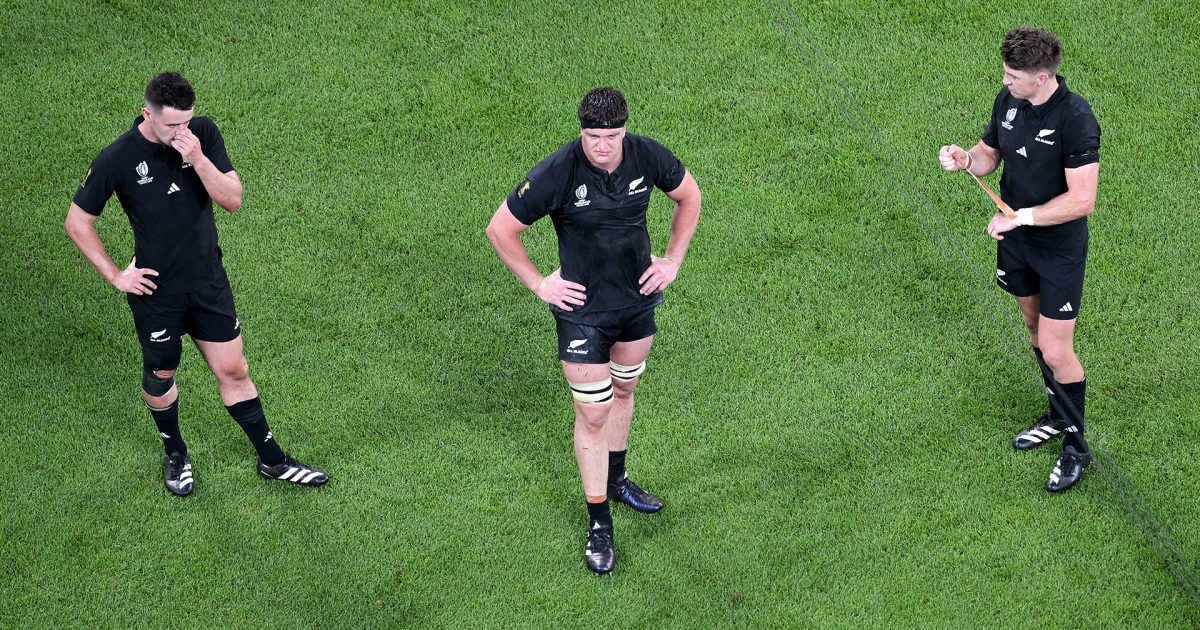
Stats expose where the All Blacks fell short against France

The scoreboard was not the All Blacks‘ friend on the opening night of the Rugby World Cup in Paris, but much of the stat sheet was.
In what was both the largest loss the All Blacks have ever suffered in a Rugby World Cup and their first loss in the pool stages at rugby’s showpiece event, New Zealand doubled their opponent’s defenders beaten tally.
New Zealand ran for 652 meters from their 112 carries, with a gain-line success rate of 62%. That running meters tally exceeds any other match the Kiwis have played this year.
France on the other hand chewed through 423 meters from 101 carries with 42% gainline success.
New Zealand were attacking in a hurry and achieving respectable breakdown speed on attack, their average ruck speed (3.53) was a whole second faster than France’s (4.67), and that was with 20 more rucks total in the match.
42 per cent of New Zealand’s breakdown clearances came under the golden two-second mark.
On average, New Zealand scored 2.17 points per entry into France’s 22, whereas Les Bleus scored 1.43 points in that metric.
All 13 of the All Blacks’ points came from attacking within their opponent’s 22, while just 10 of France’s points came from entering New Zealand’s 22.
So, where did the All Blacks fall short?
Well, as the All Blacks pointed out post-match, discipline let the three-time world champions down.
“The biggest thing was our discipline,” veteran lock Sam Whitelock said after the match. “We gave away a few too many penalties.
“At times, we built a bit of pressure and got rewards for it but we didn’t do enough.
“You’ve got to take your opportunities, you don’t get many, and there were a couple of key moments there that we didn’t execute our simple skills, whether that’s a catch-pass or cleaning a ruck. That’s where we’ve got to adapt and grow and get better.”
Six penalties were conceded on attack and a further seven on defence gave the French the opportunity to play in the right areas of the park, runing up the scoreboard with less possession and less favourable attacking opportunities.
That ill-discipline is in large part due to France’s ability to apply pressure around the park.
The French had more than double the number of dominant tackles and won almost double the number of turnovers in the match.
Their set-piece was more efficient, operating at 100 per cent at scrum time and 93 per cent in the lineout.
Perhaps most importantly, France dominated territory with 61 per cent.
All Blacks coach Ian Foster and attack coach Joe Schmidt have been true to the All Blacks DNA in their attacking philosophy as far as giving players license to attack from all over the park, but the team will need to better execute their exit strategy if they are to progress in the tournament.
“The lessons were just in execution and exiting our half,” halfback Aaron Smith remarked after the loss. “If you give penalties away, [Thomas] Ramos will punish you. But there were a lot of positives there.
Defence coach Scott McLeod will, on the one hand, be happy with a superior tackle completion rate, but a lack of dominant tackles meant France were able to offload 15 times, more than twice as much as the Kiwis.
Even with the slow start, France kept their composure and conceded just five penalties in the match.

















